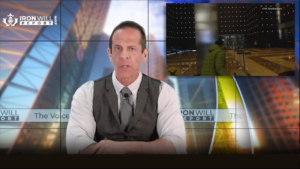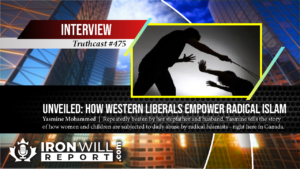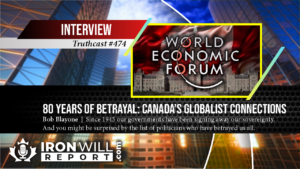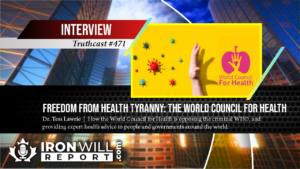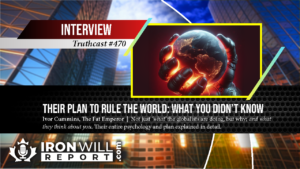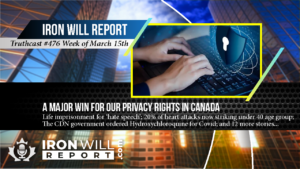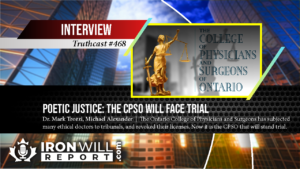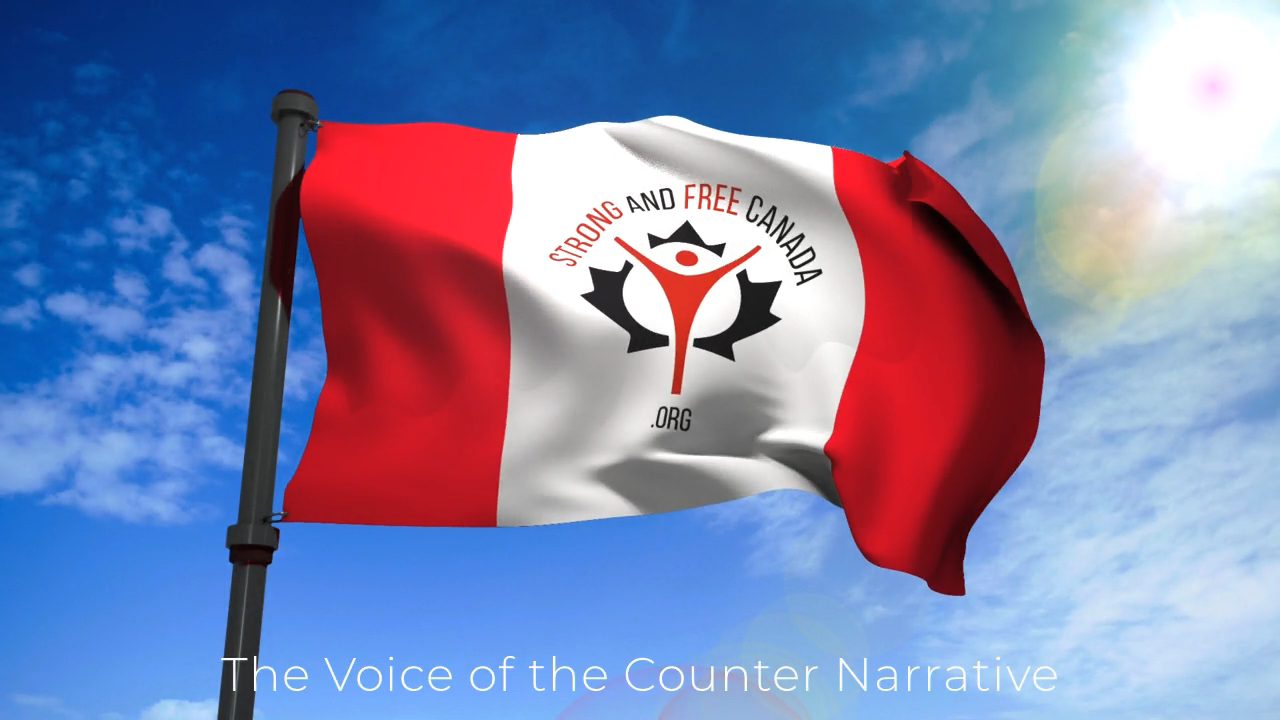The Arrest and Imprisonment of John Carpay
January 25, 2023
Most of you will be aware of the wrongful arrest and near 24-hour imprisonment of John Carpay, constitutional lawyer and president of the Justice Center for Constitutional Freedoms.
In this in-depth and in-person interview, John shares the details of the situation that led to a Canada wide warrant for his arrest on charges of obstruction of justice and intimidation of a judge. In addition, John discusses the fact that the persecution did not stop with him. Since his arrest and imprisonment another JCCF lawyer was also arrested, under the same charges, even though that lawyer had only peripheral involvement.
Please share on your social media accounts
Will Dove 00:12
Most of you, by now will be aware of the wrongful arrest and imprisonment, John Carpay, President of the Justice Center for Constitutional Freedoms. Those of you who watch my new show will know that I promised you an interview with John. So we’re gonna get the details directly from him. John, as always a pleasure.
John Carpay 00:28
Good to see you.
Will Dove 00:29
So let’s just jump right into this, because I think we’re gonna have to do actually is, before we get to the rest of the present. We have to back out almost a year and a half, 17 months I think it was. And we have to talk about what happened because as you said, more than once, it might have been inadvisable, but it certainly wasn’t illegal. So let’s talk about that first. Yes.
John Carpay 00:53
So back in early 2001, we had Jason Kenney having lunch at the Sky Palace, fancy restaurant. While this same Premier is putting Pastors in jail for breaking COVID regulations, and Jason Kenney himself is breaking COVID rules, just disgusting. We have premier Doug Ford in Ontario who at one point and I don’t know if it’s 2020 or 21, but it was illegal for Ontarians to go out to the cottage at Easter time. Easter time in Ontario, going to the cottage. That is a huge thing for a very large number of people. And lo and behold, Doug Ford goes out there with his daughters, Easter weekend and goes out to the cottage. We’ve got Trudeau not wearing a mask on a train, when this is the law. We’ve got it, we’ve got the sickening double standards where in 2020, we had these massive rallies, Black Lives Matter protests and I’m a firm believer in the right to peaceful protests. And I say thumbs up to that, you know, any cause you believe in, you should peacefully demonstrate. And that’s an absolute fundamental freedom and trying —
Will Dove 02:08
— and you yourself have spoken many times at demonstrations, often in Calgary, but other other places as well —
John Carpay 02:14
— where there’s a double standard again, because the Justice Center has been representing people that get tickets for being present, a peaceful outdoor protest. And so the law of the land is perverted. We’re moving away from the rule of law. Because the government’s approach is if we like the cause that you are protesting for, then we’ll give you a pass. And you know, you can have if you’re protesting for Aboriginal rights or environmental rights, you can blockade railway lines, and the Prime Minister will say, Oh, I’d like to sit down and meet with you. Then we get peaceful truckers in Ottawa where there’s no crime, there’s no arson, there’s no assaults, there’s no there’s no threats. They’re entirely peaceful yet he won’t even meet with them and then sends in police on horses who trampled an old lady and use of tear gas, truncheons to beat people just this ruthless, aggressive violence to shut down a peaceful protest that he didn’t like. Was it two years earlier in in March of 2020, there were Aboriginal protests or protesters for Aboriginal environmental causes. And no force was used to get them to stop blockading railway lines, which was causing infinitely more damage than what the truckers protests in Ottawa was causing to anybody.
Will Dove 03:39
They weren’t blocking anything, crime actually went down while they were there. And it doesn’t even get into the Coutts one where they were accused of blocking the border. At no point in time that they blocked the border, they blocked one lane. So it’s just absolutely ridiculous, what kinds of accusations they’re throwing out these peaceful demonstrators. So —
John Carpay 03:57
— so in that in that context as background, so I decided to, to get a private investigator to do passive surveillance on the Manitoba Premier and Chief Medical Officer. And my error in judgment was to include a judge who was sitting on our case, I wished I had not done that. Because it leaves the door open for people to speculate that you may have intended to do something very nefarious. Now, my sole intent and purpose was to hold government officials accountable to COVID regulations. So this saw the light of day, and I apologize to the judge in court and media were present. This was all very public. That was Monday, July the 12th 2021. And I said yes, you know, I am responsible for that. It was my decision. And I said it was an error in judgment. And then since that time, and this has also become public the Manitoba Law Society commenced disciplinary proceedings against me as a lawyer, which I’ve been dealing with. Now, fast forward 17 months later, and it’s December of 2022. It’s December the 30th. I’ve enjoyed a few days off at Christmas, but my workload is heavy. The Justice Center has got 300 cases all over the country. And so I was in the office working on the 30th of December, it was a Friday, I was really looking forward to some family time on that Friday night, we were planning to get together with another family. And the guy and I are friends and our wives are friends. And our kids are friends. And I was really looking forward to this event planned weeks in advance, spending Friday the 30th at this family gathering, and I got a phone call at around 130pm. And it’s from the Calgary Police Service and says it’s calling for John Carpay. You know, that’s me. You know, am I talking to John Carpay? Yes, that’s me. And he says, well, there is a warrant out for your – there’s a Canada-wide warrant out for your arrest. And you’ve been criminally charged with obstruction of justice and intimidating a member of the Judiciary. So that kind of ripped through me like, like a shock wave. I’ve never been charged criminally before. And it’s, it’s very unpleasant. And it was also like, totally like, what? And somebody asked me in an email, you know, did you did you think of it as a practical joke, and the thought never crossed my mind. And of course, it was not a practical joke. And so I drove up to the spy hill,
Will Dove 06:39
there. Just before we get on with those details, though, you’re, you’re fully charged obstruction of justice. As I’ve already said, folks, it’s not illegal to hire a private investigator to follow someone, that’s what they’re for. So I think we do have though, tell people how the investigator got caught because he did something very foolish.
John Carpay 06:58
My understanding from what I’ve heard is that the private investigator sent a 14 year old boy to knock on the door of the judges home where he lived, to ask if the judge was home. And the judges daughter answered the door and say, Well, you know, who are you and then the teenager started, kind of mumbling and he got all nervous and turned around and ran away. And this was contrary to any instructions that I that I provided.
Will Dove 07:29
So it was yeah, it was it was totally —
John Carpay 07:35
— and the other thing about surveillance is that lawyers across Canada routinely engage private investigators, particularly in the areas of family law, where a spouse thinks that his wife or her husband might be unfaithful. So this commonplace also in insurance law, if you’ve got some guy that says, oh, you know, I’m in, I’m in crippling pain, 24 hours a day, and I, you know, I want $300,000. And the insurance company might conduct surveillance and see that the guy is building a deck, and he’s, you know, on the roof, fixing the roof and a secure, you’re not in being 24 hours a day. So this is – it’s not illegal —
Will Dove 07:37
— not illegal, and it’s common. This is not a you know, I know you’re a constitutional lawyer so maybe we’re talking a little bit outside your area of expertise, but obstruction of justice, how?
John Carpay 08:19
Well, my criminal defense counsel, because I now had to hire a criminal defense counsel. You know, I served as criminal defense counsel when I was going through law school and with the Student Legal Assistance Program under the supervision of lawyers, so I’ve actually done criminal defense work. So anyway, that’s first time of my life. I’ve had to retain a lawyer, but my criminal defense counsel has said not to speak to the charges, or what I think of them. We’ll be entering a plea of not guilty. And I’m going to follow that advice that I’ve been given.
Will Dove 08:58
So let’s get back to the story. You’ve said that it was December 30. You got this call, it’s not a joke. a Canada wide warrant for your arrest for obstruction of justice and intimidation. Which is, to my mind, patently ridiculous, because if the investigator is doing his job, the judge doesn’t know he’s being followed. So how can that possibly be intimidation if you don’t know the guy’s even there? So anyway, so that’s my opinion, because you know, I’m not the one thing representative so I can render my opinion of these charges, which are ridiculous, but please carry on. The story of what happened following that phone call?
John Carpay 09:38
So I drove my – the Justice Centre’s office is in southwest Calgary and I drove, it was about a half hour drive to the far north end of the city. There’s a facility there, a jail. It’s called Spy Hill. Spy Hill’s arrest processing facility. And it’s a special kind of jail that is designed to hold people usually for just a few hours. So let’s say somebody gets pulled over for impaired driving and they do a breathalyzer. And the police officer says, you know, you’re drunk as a skunk. So you’re coming into the police car and we’re having your car towed, they would take somebody like that down there. Or, you know, any other crime. If you get arrested, you go down there, I don’t know, if they do it for everybody. I don’t know about shoplifting but certainly for a lot of crimes, you get arrested, you go down there, you appear before Justice of the Peace, and that’s by a closed circuit television. And then, you know, typically, unless you’re charged with first degree murder, or counterterrorism, or some very significant crime, typically, people are released, but there is that process in place. So you’ve been arrested, you’re detained, you appear before Justice of the Peace, you sign a promise to appear in court, and you get released. So the police told me repeatedly, firstly, on the phone, and then after even after I got to the facility, and they said, they said, Well, you know, we can’t tell you, if it’ll be two or three hours, maybe four hours, but you should be out the same day. So I, and they said, If you drive up yourself, and you’ve got your own car, then as soon as you get out, you can hop back in your own car and be on your way. So you can just drive up here and you know, rather than… The implied threat was if you don’t turn yourself in, we’re gonna come and get you. And that that would be unpleasant. He didn’t say that, but it was kind of reading between the lines, it was kind of, you should really turn yourself in. So I decided – and I did not contact a lawyer. I had somebody asked me the other day, well, why didn’t you contact it? Well, it’s like, well, if I phoned a criminal defense lawyer at that moment, he or she would have said, Okay, well, there’s Canada wide warrant out for your arrest. So turn yourself. I mean, I didn’t think I’d need legal advice at that point. Anyway, I show up there parked my car, and I get into a – I ring the doorbell and I said this John Carpay, here, and then the doors open and there are two other police officers and he’s plain clothes, no fancy uniform, oh, he does have a revolver or pistol. And then there’s a third police officer and he’s this big tall guy. And he’s got the full uniform. So three of them are there. And I said, Okay, you know, I shook his hand and I said hi and whatever. And then he said, Okay, so you’re under arrest. And I said, Okay. I’ve never been through this before. And they said, Okay, so for your safety and my safety, so we can all go back home and you know, visit with family and whatever, like so, so we’re going to search you for weapons. So if you don’t mind coming over here. So you asked me put my hands on a roll and you know, did a search. And of course, I had no weapons on me. And this is kind of funny. In hindsight, I had I have this black duffel bag. But in fact, this is this is it, because I didn’t know anything about this arrest, arrest processing facility or the procedures or like I didn’t know anything, and I, yeah, I never really thought about it. And I guess I was hopeful that maybe you’d get put into some kind of a waiting room and you just take your stuff in with you. I’ve got a lot of work to do. So I said to the police officers, I said, so can I take my computer in with me? And they said no. And they didn’t laugh. But now I’m thinking I’m looking back I think there must have been laughing on the inside. Like, they probably never had somebody say, can I take my computer and with me? Because I hate waiting. So whenever I have to wait anywhere, anywhere, anytime, anyplace where I have to wait, I pull up my computer because I’m always behind on emails. Anyway. So no, you can’t take your computer with you. And I said and they said we can take it inside and we can store it or you can put it in your car. And you know, they said like you’re not going to be here overnight. It’ll just be a short while. There was not that cold out for Calgary standards. It was maybe zero or five below zero was not incredible. So I said I’ll put it in the car and they said okay, so we walked back outside and I put the computer bag back in the car, close it and came back. And so then we went through to like heavy security doors. One of them a police officer opened up it was I think it was fingerprint sensitive. He put his hands on it and then it opened now I got formally entered with their whatever computer there’s a female cop who was behind the counter and looked at my name and this n’ that, entered the data. Then I had a second search. This one was quite thorough. Well, I’m grateful I got to keep my clothes on. And I don’t I say that serious I’m not joking.
Will Dove 15:00
You should because folks, if you’ve seen my interview with Artur Pawlowski not joking here. I was actually, when you told me this story later, I was surprised they let you do that. Relieved but surprised.
John Carpay 15:12
Yeah, there is no, you know, the staff there, at least in in I was well treated under the circumstances. I thought they were professional, they were polite. They were as friendly as possible under the circumstances. I mean, you know, philosophical question of, you know, how friendly can I be to you, when I’m locking you up in a soul, there’s obviously limits to friendliness, but they were basically as friendly as possible under the circumstances. They were polite, they were courteous, they were professional. You know, I was not handcuffed. I was not verbally abused. I was not yelled at, but it was all – the whole thing was fairly relaxed, I thought. So the second search, I don’t know this, but I think they were looking to see if there is drugs or other contraband inside the fabric, because when you did the search, they searched like every, every inch of, of, of your pants in your shirts, they searched it. And I had a choice to keeping on a dress shirt, which I happened to be wearing that day, or just the undershirt. So I’ll keep the dress shirt and it’ll look nicer when I appear before the Justice of the Peace. I didn’t give it a lot of thought. So then went into another room and I could take off my, my dress shirt and my undershirt and then put the dress shirt back on. They took the undershirt away with my wallet, my shoes, and my wedding band, I was without this for 23 hours, I was allowed to keep my glasses. And then then I got escorted to my cell. And so all I had was my socks, pants, over shirt, like a dress shirt, and glasses. And that was it. And I was taken out quite early on once for a quick medical exam. And that was the lady was very polite, a paramedic and she said I’m going to ask you the same questions I ask everybody else. So do you have any health conditions? Do you have heart conditions? Just a half dozen questions. Do you take any prescription drugs? What is your alcohol consumption? kind of almost like an annual physical, just kind of generic questions. And it got really interesting at one point, and there’s three policemen that are standing off to the right. And she says, Do you use cocaine or heroin or fentanyl? And I think I laughed a little bit. I said, I haven’t even tried those things like let alone being a regular user. But I thought you know, I wonder how somebody else if I wonder if anybody would answer that truthfully, when you got three police officers standing. And then she took my blood pressure. And she said it’s a little on the high side. But that can be expected by the circumstances. And so I said, well, a medical doctor once told me that I don’t have high blood pressure, but I do have the ability to give it to others. So then back into my cell, and I’m basically there the next 23 hours. I got let out twice for phone calls with lawyers. I got let out another time for fingerprinting. That was really disappointing, because so I checked myself in there at 345pm and finally, it’s 11pm They finally call me out on my cell to get fingerprinted. Which another thing I’ve ever gone through and then they said you know the Justice of the Peace is only sitting until midnight. And you’re gonna spend the night here. Like that was that was disappointing.
Will Dove 17:11
So the officer who told you originally you wouldn’t be there that long. He wasn’t lying to you. He just didn’t count on the timing of things. Is that what happened?
John Carpay 19:20
That’s my best guess. I think that my and this is more this is I’m conjecturing, surmising, theorizing I think this detective he’s probably done you know a number of arrests over the years but this is not his daily work. arresting people is not his daily work. He’s investigating crimes and he certainly hadn’t been investigating anything that I may have done because they were acting at the behest of the Winnipeg Police. So they had a fairly neutral it’s kind of like we’re just agents on behalf of the Winnipeg Police and that was it. So I don’t I don’t think he I don’t think he was trying to deceive me. And normally, you are in there for 2 – 6 hours. That’s the norm. I heard one of the police say at one point that because it was December 30. Now, crime rates go up with alcohol use. So Christmas Eve and December 31, you get a lot of, you know, when people are under the influence, they’re more likely to beat their wives or drive drunk or destroy property or, you know, do stupid things, bad things, so on and so forth. So I was told like that there was a lot of people even on December 30, you know, some people don’t wait until the 31st until they started to start drinking. So more alcohol consumption, there’s more people in there. But I don’t, I don’t think he tried to deceive me. But now you got stuck in a cell for 23 hours, please describe the cell that you were in, you know, quite bearable for 2 – 6 hours, it was even bearable for 23 hours, depending on what you compare it to, which we can talk about later. But it was it was roughly 12 feet by 12 feet, it was concrete, there’s paint on the concrete. So you know, it was relatively clean, unpainted concrete is kind of gross, but and it was quite warm, it was probably a little bit a few degrees higher than 20. And there’s a toilet and a sink. And there’s camera on the ceiling to ensure a lack of privacy, which it bothered me at first. But then, towards the end of 23 hours, I kind of thought, you know, these people have probably seen 1000s people using the bathroom, I didn’t care anymore. And I think they’re doing it for the they’re not doing it for the purpose of trying to violate your privacy, but they’re looking out for people that might be suicidal, or psychotic or somebody who has a medical problem. And they have a heart attack or epileptic seizure or something like that. So
Will Dove 21:55
If I recall correctly, there was no contraband in this room,
John Carpay 21:58
No cotton, no bed, no mattress, no pillow, no blanket, nothing.
Will Dove 22:02
So the only thing in this room was a toilet and a sink, correct?
John Carpay 22:07
And there’s kind of a bench along the wall that was like a foot and a half high and a foot and a half wide, or about two feet, two feet wide and two feet high. So it was kind of a concrete bench of sorts that was built into the wall, which is okay for if you want a place to set. That’s okay, you got a place to sit. I guess that’s better than just the floor. The problem is, if you’re forced to stay there overnight, as I was, well then like this can become your bed, which I didn’t feel comfortable sleeping, I thought if I if I managed to fall asleep, I might wake up in the middle of the night and roll over and fall two feet down onto the concrete floor. And then But then I tried to sleep on the concrete floor and it just uncomfortable. And these bright lights, they’re —
Will Dove 22:51
— now I’m gonna paint the picture here because you’re sleeping on a concrete floor. Yeah, but you’re stuck in this room. And all you’ve got is the clothes you’re wearing. Yeah, they didn’t give you a blanket or anything, nothing right? Then you’re stuck in there for almost almost 24 hours?
John Carpay 23:02
I wouldn’t need a blanket to keep warm because it’s always warm, right?
Will Dove 23:06
You mentioned that but you’re sleeping on concrete.
John Carpay 23:09
If I’d had a blanket, I may have gotten more sleep or blankets to sleep on, I would have used the blanket as padding.
Will Dove 23:15
At least laid on rather than on the concrete floor.
John Carpay 23:20
And then we get the bright lights, fluorescent light, just regular normal fluorescent lights but quite bright. And, you know, I know people that they have no problem sleeping when there’s light on but I’m not one of them. I’m in the cat.. I’m with the people that way I need darkness to sleep. And if there’s light on I can’t sleep. So it’s just it was what it was
Will Dove 23:44
or what happens when they finally released you 23 hours later.
John Carpay 23:48
So I had an appearance before the Justice of the Peace. And I had I had a very terrifying moment on the morning of Saturday the 31st I was talking to my lawyer by phone they have that that’s the one thing they’ll say yes to you know, I asked for a Bible or books and no reading material aloud. But if you say I want to talk to a lawyer, they say okay, we’ll get back to you will you know when a phone booth is open. So now I don’t I didn’t ask that seven or eight times. I don’t know if they start to say no after you’ve asked multiple times, but that was not an issue. So I got out, to and I got into this phone booth. Which and I thought I’m glad I don’t have claustrophobia because they lock the phone booth that you’re in. Which to somebody who suffers from claustrophobia would just probably freak out because it’s pretty small space. So you pick up the phone and the you know, they tell you to wait for the lawyer or whatever. This lawyer told me that I would appear before Justice to the Peace and I would then be transferred to the Calgary Remand Center which is a – more – which is a prison where they do have beds, but they keep people there for days on end, days or weeks. It’s kind of a short term prison facility, but they do have beds. And he said, you’re going to be in there for up to six days waiting for the Manitoba Justice to send two staff guards, policemen, whatever to fly to Calgary to pick you up and escort you to Manitoba, and then you’ll be put in prison there. Oh, I was just that really terrified me.
Will Dove 25:33
And I want to picture for the for our viewers, because you’re taking this phone call and this, this isn’t like what we see in the movies where you’ve got two people sitting on either side of a piece of glass talking on the phone? No, you’re locked in a little tiny phone booth, presumably not far from your cell.
John Carpay 25:47
That’s right. Yeah.
Will Dove 25:48
And down the hall down there. I’m assuming the cop was standing outside the phone booth.
John Carpay 25:52
I don’t know. They lock the doors. So they leave you alone for 5, 10, 15 minutes. If you’re done your call, you kind of tap on the window, but you might have to wait five or 10 minutes before they let you back out of the phone booth to put you back in your cell.
Will Dove 26:03
Okay, so I’m just I’m, I’m sorry for it. But I have to summarize this because this is this is just so bizarre. Here we’ve got a man who has done absolutely nothing illegal. You’re arrested the day before New Year’s Eve when you were planning to get together with friends. You’re stuck in a cell, a bare concrete cell sleeping on a concrete floor, for 23 hours. Now you get locked in a ton of a phone booth where you talk to your lawyer and your lawyer tells you you’re gonna be stuck there for five or six days until they come and arrest you, the Winnipeg Police to take you back to Winnipeg and throw you in prison there?
John Carpay 26:35
Yep, now, my terror lasted for about five minutes. Because I said like this there’s something wrong here that this cannot possibly be for real? Well, it turns out that this criminal defense lawyer was kind of operating out of the procedure manual. Because usually if you have an out of province arrest warrant, right, so let’s say you live in Manitoba, and you commit a crime in Manitoba. And let’s say you move to Calgary or you’re on holidays in Calgary or you’re visiting family on Calgary or your business in Calgary. What typically happens if you live in Manitoba, you might get arrested here but you do get transported back to Manitoba. But I explained to this lawyer I live in Calgary, my wife and kids are in Calgary. My job is in Calgary. Like why, why would you waste taxpayers money on transporting me to Manitoba when clearly I’ve turned myself in? I think I’ve indicated that I’m going to be cooperative with the process. Right? Anyway, after my five minutes of fear, he said he said oh, and he was adamant, he said he said no, your chance of the Crown prosecutor consenting to your release is one in a million, it’s not going to happen. You’re going to be locked up for the next six, up to six days waiting to you know, anyway, turns out that the Winnipeg Police or the crown prosecutors, I think the latter in Manitoba had already conveyed instructions to the Calgary police that I was to be released in Calgary. So it was an innocent mistake on the part of the criminal defense counsel. But man, would that – was that was my that was my worst moment in jail was hearing I’d have to spend like six more days in there. So he put me on hold for a few minutes and he’s looking through documents and he talked to the Crown prosecutor this and that, and then he got back to me and said, No, it’s going to be the Crown prosecutor is agreeable to having your release today. Okay, so then back into the cell again, because it’s a slow system. And then around two o’clock in the afternoon, I get taken out on my cell, I get into this room and there’s like a video appearance. And so on the TV screen you’ve got the Justice of the Peace and the Crown prosecutor. My criminal defense counsel paid for by legal aid and me and there’s the four of us on the screen and then criminal defense counsel said the crown and I have a joint submission Mr. Carpay be released immediately and no bail conditions. So I guess they trust me to show up for court and then I was like Okay, good. Okay, so I’m gonna get out and then the guards escort me back to my cell. I said like well, you know, I’ve been officially released now like, do you have you know, is there some different place like maybe you have a waiting room or something for people that are just waiting for the paperwork? They said, Sorry, sir. No. So back into that cell for another hour or two hours, It’s – there’s no clock on the wall. And you don’t you don’t have your wristwatch and nor cell phones you have no idea what time it is.
Will Dove 29:53
So until they let you out, you didn’t really know how long it’s been in?
John Carpay 29:57
My estimate, but you could absolutely ask a guard for you know, excuse me, sir, what time is it? And they would tell you. So it wasn’t, you know, they’re not trying to abuse you to the max, you know, they tried to be as polite as possible, they’ll tell you the time. But unless you ask you have no idea what time it is.
Will Dove 30:17
So, now you’ve been released, you get a statement on camera in the parking lot, which many people seen. If you haven’t, you can see it at jccf.ca at their website. So you get to go back home, ordeal, presumably over. But it’s not because there’s another lawyer involved and they’re going after him too.
John Carpay 30:37
Yeah, I got out at 2:45pm on the 31st. So 23 hours after having turned myself in. My car was there it was all safe and sound. My computer was not damaged from being in a cold Calgary night overnight. My computer’s been working fine. It was met up by one of my colleagues and he recorded that statement, and that’s on Justice Center website. So I drove, I drove home. And it was great to see my wife and kids. And I find out this was also unexpected on Thursday the 12th. I find out that Justice Center lawyer by the name of Jay Cameron has been arrested on the same charges. And you know, his his involvement in the in the surveillance stuff was a tiny fraction. I think the I think the charges against him are completely baseless. And I think that’s something you know, I can say, because that’s my opinion. And it’s not my case. So he has retained criminal defense counsel in Manitoba. And now —
Will Dove 32:07
— now, of course, you run a large legal organization the JCCF, you’ve got 16 lawyers, where you’ve got 10, paralegals or something like that, and you’ve got office staff. You’ve got, you’ve been, you’ve been around for 10- 12 years, now, a lot of donators out there who have been donating to your organization, but you’re not taking your legal costs from the JCCF.
John Carpay 32:29
Yeah, that’s correct. We, we talked about it internally, we got we got some advice from charities lawyer, and the decision was made, which I agree with 100%, that the Justice Center is not going to pay for my criminal legal defense. And so I in the days ahead, I’ll be setting up my own website to that effect, and raise some money that way to help defray the costs because this could cost, this could cost me anywhere from $50,000 to $100,000. Over the next three years, you know, I don’t know – I want to I want to back up for a second and I’m sorry to if this derails, but the thing that got me through the 23 hours, very easily it was I continually thought about Tamara Lich, Pastor James Coates, Pastor, Art Pawlowski, Pastor Tim Stevens. These are four Canadians that spent weeks in jail and since I’m talking about them, and I’m not talking about my own charges, this is political intimidation. If you read the Criminal Code section that Tamara Lich was charged with and you compare that to the facts of being somebody and I’m not sharing any secrets here. It’s a matter of public record. She was – she testified before the inquiry – the Commission into the use of the Emergencies Act. Tamara Lich was in Ottawa for three weeks. She was a key leader. Of course, there wasn’t one organization, it was a loose group of people, but she is one of the leaders. She’s in Ottawa. She’s one of the leaders of the peaceful protest. She didn’t bring her truck to Ottawa. She spent, as far as I know, almost all of her time in a hotel room or maybe some time on the streets here and there. But in any event, when you look at the facts, and when you look at the criminal charges, in my view, they just don’t line up. They just don’t hold water. And so I think and I’ve said this in some of my columns, I think that that charging Tamara Lich criminally, is just a designed to intimidate her and to send a warning shot across the bow to anybody else. Don’t mess with the government. Be a good citizen. And obey all the COVID rules and don’t raise a stink and don’t spread disinformation, et cetera, et cetera. I think it’s political intimidation.
Will Dove 35:10
But of course, they put a gag order on her. Yes. Which is why despite the fact that I have many contacts with the organizers of the Freedom convoy, I have not been able to do literally reservations not allowed to speak.
John Carpay 35:20
Yeah, that that, too, is is a disgrace that she cannot exercise her fundamental charter freedom of expression, so that the generosity of donors to the Justice Centre has made it possible for the Justice Centre in 2022 to pay for all of her legal bills, and they – which were substantial, and then I thought were her 49 days in jail on a charge, which if she was convicted and found guilty, and I think she I think she isn’t entirely innocent. But if she was convicted and found guilty of that offence, she would not spend a single day in jail. Because it’s a minor offense, it’s interfering with property or property damage,
Will Dove 36:06
And certainly not being marched into court and shackles.
John Carpay 36:10
No, it’s political intimidation. So you know, that, it made it just you know, we’ve talked, I’ve talked about how unpleasant it wasn’t, yes, it was unpleasant. However, bigger context, when I think about what Tamara Lich went through, and these Pastors, and then going back in history a bit it just so happened that in the month prior to getting arrested and jailed. In the month prior, I read two books by two people, two individuals who were active in the Dutch resistance against the Nazis. One of them was a Pastor, he was fighting for parental rights and education. The Nazi occupation government was trying to strip local schools of their autonomy, to hire their own teachers and have their own curriculum. And I won’t get into it now. But let’s just say that that battle did not end in 1945, with the end of the Second World War, and that’s a battle that rages on today. This whole idea of attacking parental rights and taking away from parents the right to choose the kind of education that their own children are going to have. That remains a big battle. This Pastor opposed the Nazi efforts to centralize control over education. He was arrested, he was jailed initially in Dutch prison, then a Dutch concentration camp. And then he was taken to a dark hall, which was the first concentration camp set up by Adolf Hitler shortly after taking power. And it was hundreds of 1,000s of Germans went through, they were – the first people to go to Dachau were communists, Social Democrats, and Christians who spoke out and anybody else for any reason. But those were the biggest groups, communist socialists, and Christians and anybody else who criticized or tried to oppose the Hitler regime got sent to Dachau. And people there dropped dead like flies, they worked them to death, you got a slice of bread in the morning, a slice of bread at night and a bowl of thin watery soup. That’s it. And on that, on those rations, you had to do hard labor 16 hours a day. And if you got sick, there was no medical care, no hospital.
Will Dove 38:29
I understand where you’re going with this. John, you’re here. Because you said earlier on in the interview. Given what could you compare it to your own 23 hour incarceration was a cakewalk. And I understand that. I see where you’re going. Because you’re making a reference to other people who stood up to tyrants for certain people’s rights, and the horrible things that happened to them. But this isn’t 1940s World War Two Germany. This is 2022, 2023.
John Carpay 38:57
But back then, yeah, it was 20. This happened in 2022. Yeah,
Will Dove 39:00
In Canada and you’ve done you haven’t committed any crimes, you have no criminal record. You’ve never been arrested in your life before. They come after you and Jay Cameron, on these ridiculous charges. He’s not the one who issued these charges.
John Carpay 39:11
Never. Well, it was the Winnipeg Police that that’s a matter of public record. Police. So I’m on their website. They did. John Victor Carpay, 55. I’m glad I’m not somebody who’s embarrassed about my age, like some people would find that a horrible privacy violation, but I’m like, Yeah, okay. Yeah, I’m 55.
Will Dove 39:36
That’s fine. So but this is where I’m going with this. Because, yes, it’s issued by the Winnipeg Police 17 months after the fact. Now we know it’s government intimidation, but somebody had to give the order. Somebody had to say issue these charges against John Carpay and Jay Cameron, arrest them, throw them in prison. Do you theories of what that might be.
John Carpay 40:00
You know, I don’t know. Cert – I can say for sure that I’ve never been contacted by the Winnipeg Police or by any other police force in Canada in the past 17 months. So again, getting that phone call that was like that was a bad moment, you feel this wave of shock kind of ripping through your body, it’s like, you know, you get, your criminally charged, and there’s a Canada wide warrant out for your arrest. So it’s like holy cow 17 months after the fact, all of a sudden, without ever contacting me
Will Dove 40:35
So, you know that I do this in my interviews. And I think there’s a perfect way to do this with if you had final thoughts for our viewers on all of this. So maybe not just your arrest and Jay’s arrested and these ridiculous charges, but everything that’s going on in the country? What would those thoughts be?
John Carpay 40:51
I am right back to work, running the Justice Centre. So I think I think that’s, that’s important. And I hope people can take encouragement from that. It’s, I have said in speeches many times, quitters never win. And winners never quit. And so it’s just important to keep on going regardless of what happened. There’s a lot of people have suffered a great deal like you think about students getting expelled from university for not getting injected —
Will Dove 41:22
as did my daughter.
John Carpay 41:24
Horrible, it’s horrible. People losing their jobs, and then the federal government says Oh, and you’re not eligible for EI, you know, people getting fired over refusing to get injected. People who, even when working from home, are told by their employer, they have to get injected, and they refuse and they still get fired, even though they’re working from home. Like you know it – people who, occasionally they’ll visit the office. But as far as I can tell, they mostly do their work remotely. So all of the suffering, the mental health damage to children by forcing them to wear masks and closing down schools, the businesses destroyed, the life savings destroyed, the people driven to suicide. I mean, it’s just been absolutely horrific. So the important thing is, we keep on going. Because the only thing necessary for evil to triumph is for good men to do nothing. That’s an old saying attributed to Edmund Burke. The other one is that I’ve often said it’s better to die standing than to live on your knees. And so we have to continue the fight. And I’m confident we’re going to win in the end because truth always vanquishes the lie. Freedom always wins out over tyranny and justice will always triumph over injustice.
Will Dove 42:53
Neither will, and John, you and I have become very good friends in the last couple of years. And you made that quote that all is required for evil to triumph is for good men to do nothing. I can tell you I know this man personally. And John when it comes to good again, you are one of the best.
John Carpay 43:07
Thank you.
Will Dove 43:09
So thank you so much for everything you’ve done.
100% Secure Donations
Recurring monthly donations only. Updated manually.

